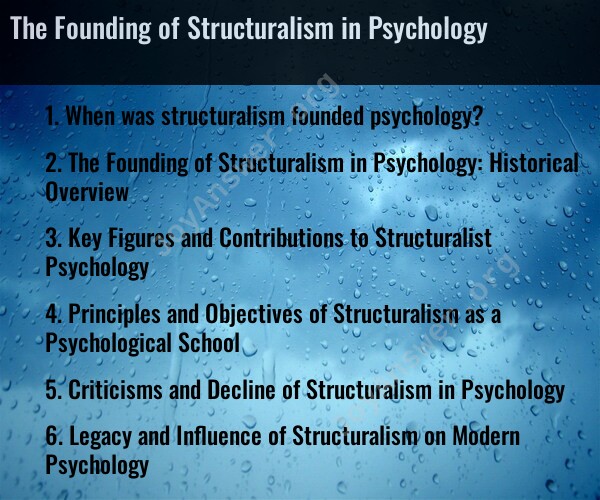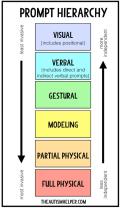When was structuralism founded psychology?
Structuralism is one of the earliest schools of thought in psychology, and it is often associated with Wilhelm Wundt, a German psychologist. Structuralism is generally considered to have been founded in the late 19th century. Wilhelm Wundt is often regarded as the father of structuralism in psychology, and his work is considered instrumental in the development of this psychological approach.
Key points about the founding of structuralism in psychology:
Wilhelm Wundt: Wilhelm Wundt established the first psychology laboratory at the University of Leipzig in Germany in 1879. This is often seen as the birth of psychology as an experimental and scientific discipline.
Focus on Consciousness: Structuralism was concerned with understanding the structure of human consciousness. It aimed to break down mental processes into their basic components to analyze the fundamental elements of human experience.
Introspection: Wundt and his followers used a method called introspection, in which trained individuals would report their conscious experiences while observing and reflecting on various stimuli. This was a way to access the elements of mental experiences.
Edward Titchener: Edward B. Titchener, a student of Wundt, played a significant role in popularizing structuralism in the United States. He introduced and further developed the method of introspection and promoted the study of structural elements of consciousness.
While structuralism made important contributions to the early development of psychology as a scientific field, it eventually gave way to other schools of thought, such as functionalism and behaviorism, which shifted the focus from the structure of consciousness to the functions of behavior and observable actions. The decline of structuralism occurred in the early 20th century, but its influence on the history and development of psychology is still recognized.
The Founding of Structuralism in Psychology: Historical Overview
Structuralism emerged in the late 19th century as the first major school of thought in psychology. Founded by Wilhelm Wundt, a German physiologist and philosopher, structuralism sought to understand the basic elements of consciousness and how they combine to form complex mental experiences. Wundt established the first experimental psychology laboratory in Leipzig, Germany, in 1879, where he and his students conducted rigorous experiments to investigate the structure of the mind.
Key Figures and Contributions to Structuralist Psychology
Wilhelm Wundt (1832-1920): The founder of structuralism, Wundt established the first experimental psychology laboratory and introduced the method of introspection, a technique for systematically observing and reporting on one's own conscious experiences.
Edward Bradford Titchener (1867-1927): Wundt's student and a prominent figure in American structuralism, Titchener further developed the methodology of introspection and emphasized the importance of analyzing sensations, images, and feelings as the basic elements of consciousness.
Principles and Objectives of Structuralism as a Psychological School
Breaking Down Consciousness: Structuralism aimed to break down consciousness into its simplest, irreducible elements, known as sensations, images, and feelings.
Introspection as a Research Method: The primary method employed by structuralists was introspection, where trained observers carefully analyzed their own conscious experiences in response to controlled stimuli.
Analysis of Mental Processes: Structuralists sought to identify the fundamental laws governing the association and combination of these basic elements to form complex mental processes like perception, thought, and emotion.
Criticisms and Decline of Structuralism in Psychology
Limitations of Introspection: Critics argued that introspection was subjective and prone to bias, making it difficult to obtain reliable and objective data about the mind.
Focus on Elements, Neglecting the Whole: Structuralism was criticized for its emphasis on breaking down consciousness into isolated elements, overlooking the holistic nature of mental experiences.
Rise of Functionalism and Behaviorism: In the early 20th century, functionalism and behaviorism emerged as competing schools of thought, challenging the structuralist view of the mind and shifting the focus to the functions and observable behaviors of the organism.
Legacy and Influence of Structuralism on Modern Psychology
Despite its decline, structuralism left a lasting impact on the development of psychology:
Emphasis on Scientific Methodology: Structuralism's emphasis on rigorous scientific methodology and experimentation laid the foundation for modern psychological research.
Exploration of Consciousness: Structuralism's efforts to understand the structure and elements of consciousness laid the groundwork for later studies of perception, attention, and memory.
Influence on Cognitive Psychology: Structuralism's focus on mental processes influenced the development of cognitive psychology, which studies how the mind processes information.
Structuralism, though no longer a dominant school of thought, played a pivotal role in shaping the scientific study of the mind and continues to influence modern psychological research and theories.












